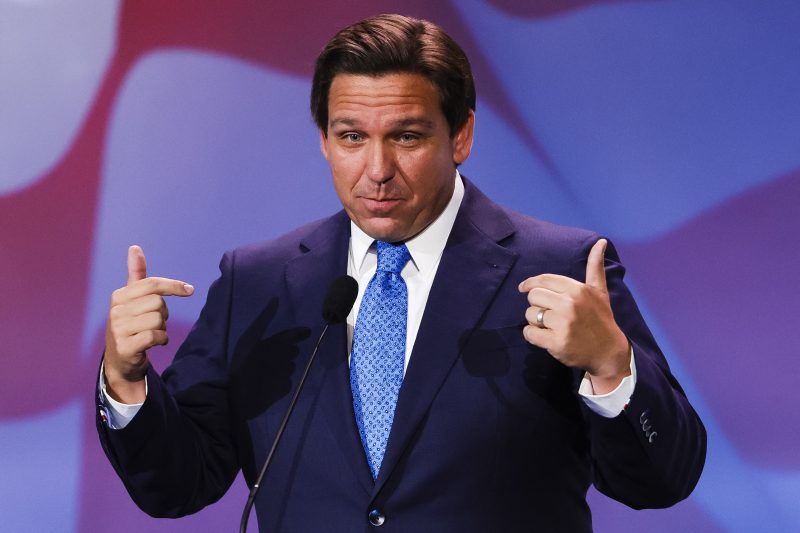Donald Trump is in trouble.
Maybe not a lot of trouble. Maybe just the sort of trouble that Trump has wriggled his way out of so many times in the past. But the former president’s bid to be the future president, made formal last month, is off to a wobbly start.
That’s reflected in recent polling. Republican enthusiasm for Trump has waned, with Florida Gov. Ron DeSantis (R) as the primary beneficiary of the shift. A Wall Street Journal poll released this week showed DeSantis with a lead over Trump among likely primary voters.
This is in part a function of DeSantis’s unsubtle efforts to cultivate support among Republican voters — including by embracing energizing political positions that Trump can’t or won’t. But it is also in part because DeSantis has not yet been tested in a national primary fight — a fight that promises to be bruising.
On Wednesday, CNN published new polling, conducted by SSRS, showing how Trump’s position with his party has softened. In February, about half of Republicans wanted Trump to be the party’s 2024 nominee. That’s fallen to about a third. Among the 6 in 10 Republicans who now say that the party should nominate someone else, about 2 in 5 say that person should be DeSantis, with more than half saying they don’t really care who it is. That DeSantis number has almost doubled over the course of the year.
In part, that’s because Trump is seen as too extreme even by members of his own party. A bit over a third of Americans say President Biden is too extreme in his politics; two-thirds say the same of Trump. Among Democrats, only 4 percent say Biden is too extreme. Among Republicans, 45 percent say Trump is.
That Wall Street Journal poll asked Republicans how favorably they viewed both Trump and DeSantis. More than 8 in 10 said they viewed DeSantis favorably. Only 7 in 10 said the same of Trump, mirroring trends shown in other polling.
Again, his diminished position is not just a function of Trump being viewed with increasing skepticism. It is also because DeSantis has for years tried to position himself as palatable to Trump’s base. And over the past two years, with Trump’s power diminished in both politics and the national conversation, DeSantis has been unabashed about using his position to appeal to the Republican base. This week, for example, he announced an effort to dredge up criminal charges against coronavirus vaccine advocates — mirroring his call last year to probe purported election fraud. In each case, the trigger was as much political (or perhaps far more political) than legal.
An underrecognized component of DeSantis’s efforts over the past two years, though, is how he’s leaned into and even driven culture-war issues that put Trump at a disadvantage. DeSantis leaned into his identity as the guy who opposed coronavirus restrictions early on, selling “Don’t Fauci my Florida” gear on his campaign site even as Floridians were dying of covid-19 in the summer of 2021 at disproportionate rates. His new effort to target vaccine proponents is merely the natural evolution of his long march toward vaccine skepticism. He’s framing himself as the guy who finds all of that coronavirus stuff heavy-handed if not nefarious — stuff that he will inevitably try to place at Trump’s feet.
DeSantis has also been at the forefront of the right’s fixation on gay and transgender issues. His advocacy of a policy that limited teachers’ ability to discuss same-sex relationships with students became a rallying point for the far right. The grotesque framing of opponents of such measures as “groomers” was largely downstream from comments made by Christina Pushaw, a key adviser to DeSantis. Here, too, Trump is disadvantaged: Following popular sentiment as always, he offered himself up as an ally to gay Americans in 2016, though his presidency didn’t always reflect that. He’s embraced the anti-transgender rhetoric of the right-wing fringe, but his record on LGBT issues broadly is softer than DeSantis’s.
At the same time, DeSantis is trying to eat into Trump’s established rhetorical advantages. The Florida governor has declared that Florida is “where woke goes to die,” whatever “woke” means. He advocated legislation targeting “critical race theory” (itself a malleable term) and enacted the same sort of jingoistic instructional oversight that Trump advocated as president. Then there was his fly-immigrants-to-Martha’s Vineyard stunt, an effort to glom onto a popular-on-the-right tactic for drawing attention to immigration.
If we use Fox News as a sort of thermometer of the right’s priorities, we see that immigration and “critical race theory” are perpetually popular topics of conversation. Issues related to covid-19 responses have faded, and the right-wing focus on sexuality hasn’t caught on as much. But DeSantis can point not only to rhetoric on each of these issues but efforts to apply political power to them — another way in which Trump is disadvantaged.
But, then, we’ve seen this before. We’ve seen perhaps dozens of Republican presidential contenders emerge as party favorites only to collapse under scrutiny, attack or their own stumbling campaign efforts. DeSantis benefits from not being Trump, but he also benefits from not having been under any substantial political pressure for four years. His reelection campaign was a relative breeze and involved taking fire only from the left. Should he announce a presidential bid, which seems all but certain, that would change. After all, it wouldn’t just be Trump’s gloves-off attacks he would need to fend off. There will be other candidates, too, hoping to see DeSantis go the way of past presidential front-runners such as Rudy Giuliani or Scott Walker or Jeb Bush.
If we’re going to use Fox News as that thermometer, it’s worth pointing out another divide.
Last month, Trump was mentioned on Fox three times as often as DeSantis, and Fox is not in the habit of offering particularly sharp criticism of the former president. So far this month — with DeSantis’s reelection having moved to the background — Trump has been mentioned seven times as often.
Trump’s advantage since July 2015 has been that he has a core, loyal base of support, a group that Fox News has long tried to adopt as its own. Trump’s 2016 victory was driven by that core base, allowing him to win crowded primaries until he built up enough support to start walking away with contests. He piled on fans as president, some of whom may now be looking elsewhere. But if that core is big enough and if he can erode DeSantis’s own, newer core of support, Trump may end up being in less trouble than it currently appears.








